|
|
|
Sort Order |
|
|
|
Items / Page
|
|
|
|
|
|
|
| Srl | Item |
| 1 |
ID:
145526
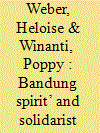

|
|
|
|
|
| Summary/Abstract |
It must come as no surprise that traces of any continuing relevance of the ‘Bandung spirit’ are enthusiastically being sought in the wake of the sixtieth anniversary of the Asian-African Conference. It was the first high-profile formal conference of newly independent (or ‘about-to-be independent’) post-colonial states at a rather momentous historical conjuncture: the continuing struggles for decolonisation were pronounced in the context of the Cold War. The Final Communiqué of the Bandung conference strongly articulated a collective political project against colonialism and imperialism, and for self-determination and racial equality, while already laying the foundations for the idea of strategic non-alignment in the context of the Cold War. It is in this sense that the Bandung conference has come to be emblematic of an event that inaugurated a radically different international political landscape to the immediate post-1945 world order. In this article, the authors focus specifically on the development aspirations articulated at the Asian-African Conference in Bandung, which they argue are the site of struggles and contradictions. As the authors show, the ‘Bandung spirit’ underlined the political project of Third Worldism, as well as the call for a new international economic order in the 1970s. Yet, they also identify some constraints and contradictions that the ‘Bandung spirit’ had to navigate and the challenges it was up against. In the final part of the article, the authors briefly discuss the extent to which the ‘Bandung spirit’ continues to resonate in contemporary global politics of development.
|
|
|
|
|
|
|
|
|
|
|
|
|
|
|
|
| 2 |
ID:
108115
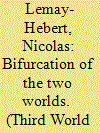

|
|
|
|
|
| Publication |
2011.
|
| Summary/Abstract |
Studies increasingly highlight the limits of state building conducted 'from the top-down'. Building on the literature and using a Rosenauian concept in a novel way, this article posits that international interventions create a 'bifurcation of the two worlds'. Departing from a study of Kosovo and Timor-Leste, the article posits that the massive arrival of staff involved in international governance will create a social gap between the international and the local 'worlds', which will in turn become a target of narratives of resistance by local actors. This bifurcation is exemplified by the 'white car syndrome', a concept representing the horde of white UN vehicles accompanying major interventions and developed in this contribution. Thus, the article attempts to shed new light on the legitimacy crises that Kosovo and Timor-Leste experienced at the beginning of the current century, while demonstrating and increasing the linkages between development studies and peace studies.
|
|
|
|
|
|
|
|
|
|
|
|
|
|
|
|
| 3 |
ID:
163469
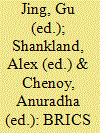

|
|
|
|
|
| Publication |
London, Springer Nature, 2016.
|
| Description |
xxi, 248p.: figures, tableshbk
|
| Series |
International Political Economy Series
|
| Standard Number |
9781137556455
|
|
|
|
|
|
|
|
|
|
|
|
Copies: C:1/I:0,R:0,Q:0
Circulation
| Accession# | Call# | Current Location | Status | Policy | Location |
| 059590 | 338.90091724/JIN 059590 | Main | On Shelf | General | |
|
|
|
|
| 4 |
ID:
123511
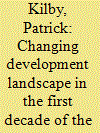

|
|
|
|
|
| Publication |
2012.
|
| Summary/Abstract |
The first decade of the 21st century has been characterised by complex and interrelated changes that have affected development. Development studies as a discipline has traditionally been concerned with the impact of colonisation and neocolonialism, and with neoliberal-related growth models. This paper argues that, since around the turn of the century, there has been a major shift in development, driven by a series of fundamental changes, including the relative failure of the neoliberal project in the 1980s and 1990s, which by the 2000s was partly replaced by a greater concern with addressing security issues with aid; the rise of China and other middle-income countries as large resource providers for development; and the rapid increase of remittance flows to lower and middle income countries. The paper looks at how both development studies and aid policy in Australia and elsewhere have been relatively slow to engage with this rapidly changing context. The big challenges for development studies will be: engaging with developing countries as development donors with different agendas for development; the decline of much of the current neoliberal paradigm; alternative sources of development finance; and the securitisation of Western aid.
|
|
|
|
|
|
|
|
|
|
|
|
|
|
|
|
| 5 |
ID:
141142


|
|
|
|
|
| Summary/Abstract |
The emergence of China as a development actor across the global South has raised significant questions regarding the extent to which the country presents new development opportunities to its compatriots in the South. My aim is to reflect on and parse out the experiences and policies that have shaped China’s development to assess how it can inform the field of development studies. I argue that we need to critically engage in China’s development process, as China’s own development has led to the emergence of many more problems than solutions, ranging from increasing inequality to exclusionary development practices pertaining to ethnic minorities.
|
|
|
|
|
|
|
|
|
|
|
|
|
|
|
|
| 6 |
ID:
160832


|
|
|
|
|
| Summary/Abstract |
In the context of rapidly evolving development landscapes, the practice of development management has become increasingly complex. Trends, such as a decline in the overall volume of official development assistance, growing domestic inequality and the localisation agenda, are seeing a shift in the way aid is delivered and managed. This is requiring development managers from the Global North to be much more aware of their own values and world view and to be highly skilled in areas such as relationship management, communication, facilitation, ethics and advocacy alongside more traditional competencies such as monitoring and evaluation. Massey University's own research with the New Zealand global development sector supports this view and we have adapted our core development management course accordingly. Through pedagogy that is value‐based, ethically informed and practice‐orientated, we are working to equip our graduates to adapt to the complexities of development management. This includes prioritising ethics and relationship management and being aware of our responsibilities to Tangata Whenua as a Treaty‐led university. Our universities are well placed to offer the kind of innovative development studies education that will put our graduates and the communities that they serve on a pathway to better development outcomes in the 2020s.
|
|
|
|
|
|
|
|
|
|
|
|
|
|
|
|
| 7 |
ID:
192308
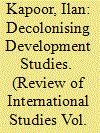

|
|
|
|
|
| Summary/Abstract |
This article explores ways of decolonising Development Studies by: (1) examining the discipline’s tendencies towards what some have called ‘imperial amnesia’, that is, proclivities towards disavowing if not erasing European colonialism, most evident in 1950s–1960s Modernisation theory, but also more recently in the work of such analysts as Bruce Gilley and Nigel Biggar; (2) considering the opportunities and perils of ‘epistemic decolonisation’, that is, ways of decolonising knowledge production in the discipline, including the limits of ‘non-Eurocentric’ pedagogies; and (3) reflecting on forms of material decolonisation (e.g., the reduction of socioeconomic inequalities by improving better access to education or resisting the corporatisation of publicly funded research) that need to accompany any epistemic decolonisation for the latter to be meaningful.
|
|
|
|
|
|
|
|
|
|
|
|
|
|
|
|
| 8 |
ID:
192923
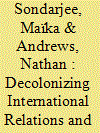

|
|
|
|
|
| Summary/Abstract |
Over the past decade, there has been a new “decolonial turn,” albeit less related than before to land and political independence. “To decolonize” is now associated with something less tangible and often under-defined. We argue that scholars, especially Western ones, should avoid depoliticizing the expression “decolonizing” by using it as a buzzword. Scholars and policymakers should use the expression only if it is closely related to the political meaning ascribed to it by Global South and Indigenous activists and scholars. Decoloniality is a political project of human emancipation through collective struggles, entailing at least the following: 1) abolishing racial hierarchies within the hetero-patriarchal and capitalist world order, 2) dismantling the geopolitics of knowledge production, and 3) rehumanizing our relationships with Others and nature. We conclude that there is a need for epistemic humility and that Western scholars and institutions must refrain from using the word too freely.
|
|
|
|
|
|
|
|
|
|
|
|
|
|
|
|
| 9 |
ID:
181839
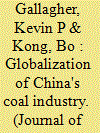

|
|
|
|
|
| Summary/Abstract |
This article examines the political economy of Chinese overseas development finance for coal fired power plants. In just over a decade China's two major policy banks provide more financing for overseas coal-fired power plant expansion than any other public financier in the world economy. We show how China's overseas surge in public financing for coal fired power plants is a function of a number of domestic push and foreign pull factors. Excess capacity, environmental regulation, and structural change are push factors that converge with rising demand for energy, pockets of coal abundance, and the lack of financing in Western capital markets for coal fired power plants. Fragmentation across the Chinese system and the demand for coal outside China's borders allow for a decline sector on the mainland to become a global Chinese powerhouse.
|
|
|
|
|
|
|
|
|
|
|
|
|
|
|
|
| 10 |
ID:
156654
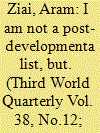

|
|
|
|
|
| Summary/Abstract |
During the course of the 1990s, the Post-Development school emerged as an innovative though controversial approach in development studies. The article examines its critical reception in the textbooks and the extent to which its authors and arguments have become influential. It argues that the relationship between development studies and Post-Development is characterised simultaneously by (sometimes explicit, sometimes implicit) rejection and integration. Examining a number of current development studies textbooks, it illustrates the growing influence of Post-Development arguments and how they have been tacitly or consciously taken up while often rejecting Post-Development per se.
|
|
|
|
|
|
|
|
|
|
|
|
|
|
|
|
| 11 |
ID:
163708
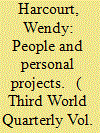

|
|
|
|
|
| Summary/Abstract |
In response to Juan David Parra Heredia’s criticism of her earlier article about her use of post-development as a tool in teaching development studies, Wendy Harcourt reflects further on how the course analysed in 2016 has evolved in the last three years and corrects the misreadings of the pedagogical position-taking by the teachers in the course.
|
|
|
|
|
|
|
|
|
|
|
|
|
|
|
|
| 12 |
ID:
163707
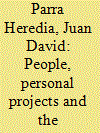

|
|
|
|
|
| Summary/Abstract |
This article makes a critique of using Post-Development as a tool in teaching an introductory course in development studies. Such a debate was initiated by Harcourt in a previous issue of Third World Quarterly as she reflected on her teaching experience in a European Institution. Harcourt concludes that the lack of engagement of some of the students in the course reflects the unwillingness of privileged middle-class pupils to challenge western lifestyles. I draw on a critical realist meta-theory about the process of learning in higher education to challenge the ontological support of that conclusion and invite her to reconsider her teaching strategy.
|
|
|
|
|
|
|
|
|
|
|
|
|
|
|
|
| 13 |
ID:
156643
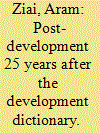

|
|
|
|
|
| Summary/Abstract |
Few books in the history of development studies have had an impact like The Development Dictionary – A Guide to Knowledge as Power, which was edited by Wolfgang Sachs and published by Zed Books in 1992, and which was crucial in establishing what has become known as the Post-Development (PD) school. This special issue is devoted to the legacy of this book and thus to discussing PD.
|
|
|
|
|
|
|
|
|
|
|
|
|
|
|
|
| 14 |
ID:
141897
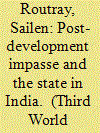

|
|
|
|
|
| Summary/Abstract |
After discussing the various points of departure suggested by scholars of development, this paper argues that, in the context of India, one way out of the post-development impasse lies in shifting the focus from development politics to the workings of the developmental state on the ground, and to change the methodological vantage point to ethnography. It is suggested that this change in approach would provide fresh insights into the workings of the developmental state and into the process of development in India.
|
|
|
|
|
|
|
|
|
|
|
|
|
|
|
|
| 15 |
ID:
174548
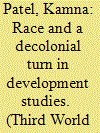

|
|
|
|
|
| Summary/Abstract |
This paper reviews and revives a longstanding conversation about race and development studies, which was prominently explored in a collection of papers on race and racism in the journal Progress in Development Studies back in 2006. This revival is timely in the context of a global call to decolonise higher education. Given the central logic of race and racism in European colonialism, and the decolonial argument that colonialism continues in the production and value of knowledge, I examine the presence and absence of race and racism in discussions of decolonising higher education and in development studies. Through a systematic review and content analysis of papers published in six major development studies journals over the past 13 years, I identify where and how race is present in current development scholarship and explore the implications of this for a decolonial turn in development studies.
|
|
|
|
|
|
|
|
|
|
|
|
|
|
|
|
| 16 |
ID:
093882


|
|
|
|
|
| Publication |
2010.
|
| Summary/Abstract |
Studies of peacekeeping have helped to reveal the complexities, dilemmas and challenges of operations since their inception, and almost certainly into the future. Yet, despite the empirical and theoretical breadth of this canon, the field continues to be dominated by political science, development studies, international law and military studies, whose scholars tend to draw on 'problem-solving', macro-level and positivist perspectives in their writings. The impact of post-structural and post-positivist epistemologies developed in sociology, human geography and cultural studies remain marginal in the field. Given this, the present article seeks to complement and develop the study of peacekeeping through its framing of blue-helmet activity as embodied, spatial-security practice that is performed 'out front' for the 'beneficiary' audience. In so doing we draw on critical geopolitics, military/human geography and sociological theorizing with a focus on space and performance. Our main aim is to show how the concepts of space and performance can be used to illuminate perceptions of everyday security by recourse to a modest, illustrative empirical component based on fieldwork in Haiti, Kosovo and Liberia.
|
|
|
|
|
|
|
|
|
|
|
|
|
|
|
|
| 17 |
ID:
149438
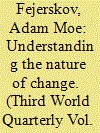

|
|
|
|
|
| Summary/Abstract |
This article argues that core lines of sociological institutionalist thought provide a set of valuable conceptual and theoretical vocabularies for exploring and explaining contemporary concerns of development cooperation. It identifies four broad categories of issues of central attention in the current study of development cooperation, and couples these with four avenues of sociological institutional research that may provide us with theoretical and conceptual frameworks for further empirically exploring and theoretically extrapolating these. Increasing attention to these theoretical concerns not only helps us progress the study of development cooperation, it may also allow us to inform contemporary institutional thinking.
|
|
|
|
|
|
|
|
|
|
|
|
|
|
|
|
| 18 |
ID:
135060


|
|
|
|
|
| Summary/Abstract |
The current international development discourse focuses much on the Millennium Development Goals (mdgs) as part of a global social contract in support of international cooperation and governance, with the debate on the post-mdgs and the Sustainable Development Goals (sdgs) indicating a shift. These goals are at least in part addressing developmental constraints confronting the world as a result of the effects the dominant growth models have had on limited resources and global goods. Rio+20 was a forum which brought to the fore the conflicting issues at stake and the challenges for any development paradigm seeking to enhance global justice and equality. This article explores the discrepancies between dominant paradigms cultivated in official discourses, on the one hand, and alternatives for another development presented as anti-hegemonic counter-models for survival strategies. It considers the role of civil society agencies and scholar activists in development studies.
|
|
|
|
|
|
|
|
|
|
|
|
|
|
|
|
|
|
|
|
|